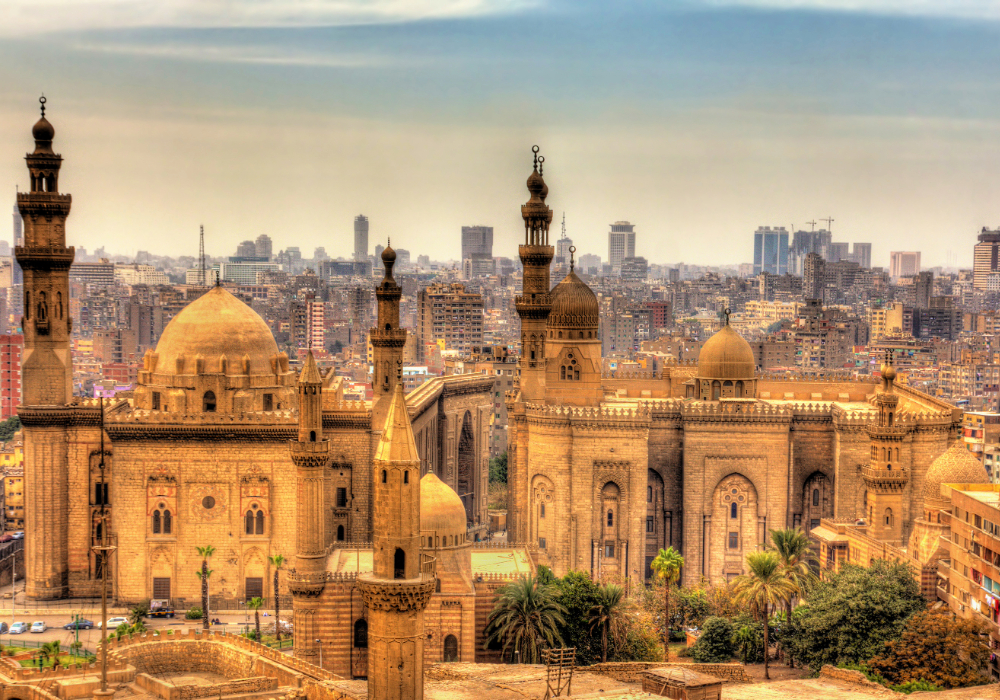
21 tips to avoid common scams in Egypt
We’ve just come back from Egypt! And we’re ready to update you on every common scam and hustle we encountered during our time there. This is a long one, so get comfortable. Or, head to the contents section to jump straight into a particular section. So without further ado… here are 21 common scams in Egypt and how to avoid them!
From Bangkok to Barcelona, scams and tourist traps are common around the globe. Local entrepreneurs take advantage of the naivety of foreign travellers. After all, we’re new here. We don’t know the prices or the customs. We probably earn significantly more money in our home countries. And if we fall for it, we only have ourselves to blame!
At the end of the day, scamming is an easy way for touts to make money without facing the same consequences they would for theft. In countries like Egypt, where the average income is far far below the amount we get paid in Europe or the USA, you can’t blame them for trying it on a bit.
A BIT ABOUT EGYPT...
Egypt is an amazing country. Yes, it’s the home of the Great Pyramids of Giza, the last standing wonder of the ancient world. But there’s so much more to do and see.
Upper Egypt is bursting with the remnants of the pharaohs. The stretch of the Nile between Cairo and Luxor is home to more temples and tombs than you can ever hope to have time for.
And although it’s these monuments that get all of the hype, Egypt’s scenery is more than just a backdrop for historic riches. The Red Sea in the East is home to some of the best dive sites in the world. And the Western Desert is a boundless sand sea sprinkled with Oases.
Egypt is also considered a very safe country for backpacking. Weapons are not carried and there are so many security checkpoints to enforce this, at museums, the metro, the roads, you name it! There’s also little chance of robbery or assault. However, scams and hustles are everywhere, and it’s considered 100% your fault if you fall for these.
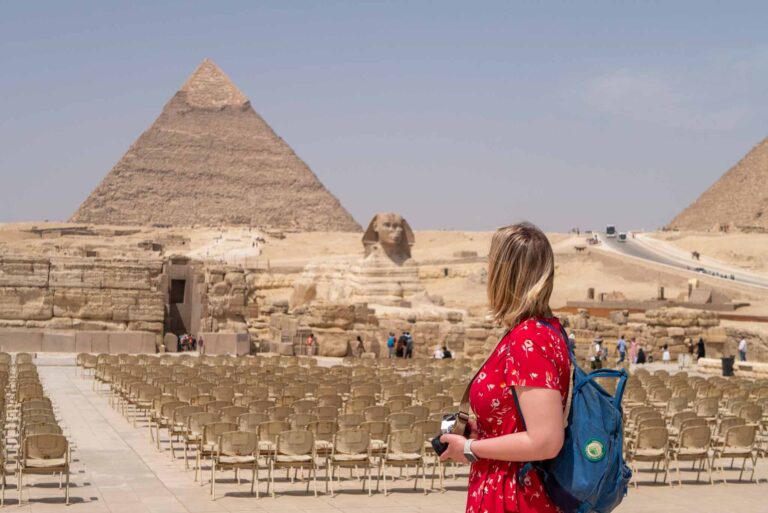
The Great Pyramids of Giza are, unfortunately, scam central
SCAMS AND HUSTLES IN EGYPT
Ask anyone who hated Egypt why they felt that way, and they’ll probably complain about the persistent harassment they experienced in tourist towns and cities. And it’s true. A day exploring the sights can make you feel like everyone just sees you as a walking wallet. Especially, if you’re not familiar with common scams in Egypt.
From touts pushing useless made-in-china garbage in the souks to the exhaustion from having to haggle over literally everything, Egypt can be overwhelming. It’s easy to feel taken advantage of. Add to that the hot weather and a jam-packed itinerary and you’ll likely find yourself feeling frazzled by mid-afternoon.
Although the harassment is annoying, it’s all pretty harmless. Scammers might seem intimidating but remember that they are only trying to scam you. They won’t try to beat you up, kidnap you, or rob you. Instead, they just want to sweet talk you into paying them money they aren’t owed. At the end of the day, you can’t avoid it, so the key to avoiding common scams in Egypt and maintaining your happiness/sanity is to smile, say no thank you, and just keep walking.
That said, if you know a bit about the common Egypt scams before you visit, you’ll save lots of money, time, and stress. Here, we’re sharing some common scams in Egypt and our tips for avoiding them.
PLANNING YOUR TRIP:
It’s not just the aggressive touts and common scams in Egypt trying to ruining your trip. It’s lazy and misinformed travel bloggers too! Despite what the internet tells you, it is impossible to see all of Egypt’s highlights in a week.
Egypt has so much to see, and the sites are very spread out. You’d be hard-pressed to cover the ‘main trio’ – Cairo’s Pyramids of Giza, Luxor’s Valley of the Kings, and Abu Simbel (near the Sudan-Egypt border) – in just a week.
People spend 3-5 days just exploring Egypt’s capital, Cairo! You need around a day to fully immerse yourself in each of the four main areas – Giza & the Pyramids, Islamic Cairo, Coptic Cairo, and the Egyptian Museum. That’s four days already!
And Egypt isn’t only about ancient temples and the glory of the pharaohs. That’s just its calling card. Egypt’s Coptic Christian heritage and Nile sunsets, Cairo’s mosques and palaces, the rippling dunes of the Sahara and the desert oasis of Siwa, and some of the world’s best diving in the Red Sea are all waiting behind those famous pyramids, temples and tombs.
If you have 3 weeks in Egypt you can see most of it. But even then, you’ll have to be choosy about what you hit, and what you miss. When it’s so hot outside, we can guarantee that you won’t want to be rushing around and ticking things off a list. So don’t be fooled, you need more time in Egypt than you think.
Now let’s dig into some of the common scams in Egypt that we encountered, how to spot them, and how to avoid them.
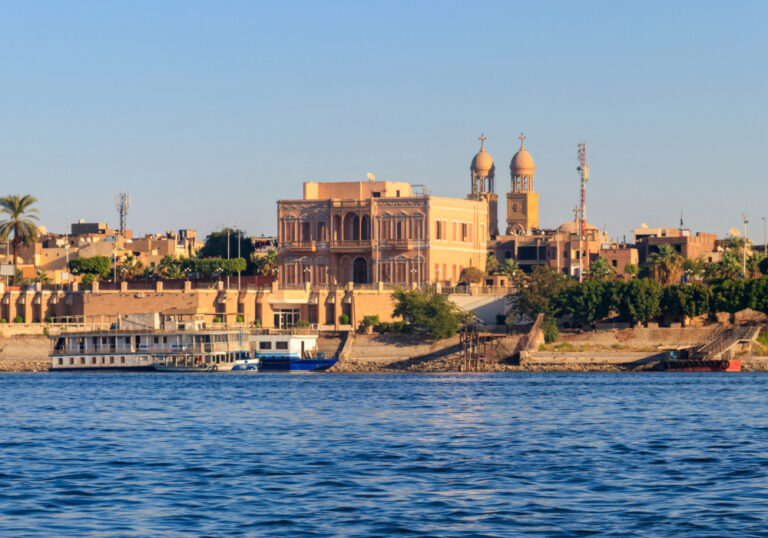
It’s easy to fall into paying more than you should to cross the Nile in Luxor
HOW TO AVOID GETTING SCAMMED IN EGYPT
Here’s a list of common scams and hustles you might encounter in Egypt. Click on any of them to learn more, including how to identify and avoid each scam:
HOW TO AVOID BEING SCAMMED IN EGYPT: GETTING AROUND
- Know how you're getting where you're going and how much it should cost
- There is public transport from Cairo Airport
- Uber drivers will try to rip you off
- Your hotel (probably) isn't closed
- The road (probably) isn't closed either
- 'Helpful' strangers usually want something
- The public ferry (Luxor/Aswan) does not close
- Always clarify exactly what you are agreeing to
HOW TO AVOID BEING SCAMMED IN EGYPT: AT TOURIST SITES
- Always buy your tickets at the official office
- You don't. need to show your ticket to anyone after the visitor centre
- Yes, you (probably) are allowed to go there!
- Never get on a camel or a horse carriage
- Don't let anyone take your photo
- Churches and Mosques are usually free to visit
- Don't get pushed into paying for a tour you never asked for
HOW TO AVOID BEING SCAMMED IN EGYPT: SHOPPING
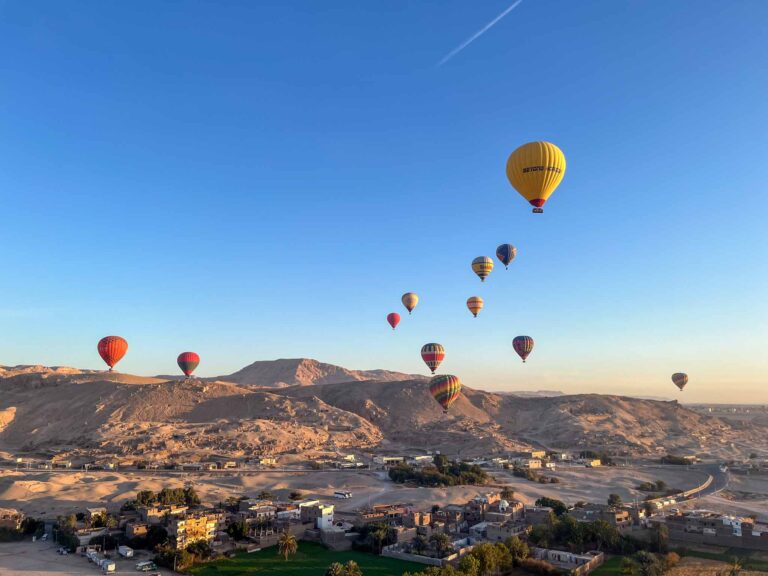
Navigating common scams in Egypt can be tricky when booking a hot air balloon trip!
HOW TO AVOID BEING SCAMMED IN EGYPT: GETTING AROUND
Tourists getting around are such an easy target. Standing anywhere with a backpack or suitcase looking clueless just screams ‘hello, I’m new here and I have no idea what’s going on!’. This makes you look easy to scam, even if you’ve already been in the country for days, weeks, or months and know your way around.
#1 KNOW HOW YOU’RE GETTING FROM THE AIRPORT TO YOUR HOTEL AND HOW MUCH THIS SHOULD COST
As soon as you leave any major transport hub, you’ll be verbally assaulted by a dozen drivers shouting over each other to try and get you in their taxi.
After all, nothing says ‘I’m new to this country and clueless about how much things cost’ like emerging from the international airport terminal in Cairo with all your luggage.
One of the many common scams in Egypt is taxi drivers charging insane amounts for a single trip. Compared to our home countries, this price may seem reasonable. But drivers may be charging double, triple, or quadruple what the journey should actually cost. And more fool you if you fall for it, right?
This is why it’s important to make a battle plan. Know how you’re getting from A to B, and how much it should cost. This can be hard. The Egyptian Pound (EGP) is pretty dynamic at the moment, and even travel guides written a few months ago are already out of date. Your best bet is to ask your hotel what the best way to get there is. They’re usually pretty helpful, even if they do try to upsell you a private taxi!
A ROUGH IDEA OF PRICES…
Private Airport Transfer: Between Cairo Airport to Downtown, expect to pay ~900 EGP. You can get up-to-date prices and book your private transfer here.
Hotel Pickup: Your hotel can always arrange a taxi for you. This will be cheaper than a pre-arranged private transfer but more expensive than haggling for a taxi as the hotel will take a cut. Expect to pay ~600 EGP.
Uber/Taxi: An Uber between Cairo airport and Downtown was between 200 – 250 EGP in April 2024. Check the price on Uber, and don’t pay much more than that if haggling for a taxi!
Public Bus: Local buses 400 and 500 run every 20 mins from the airport bus station in Terminal 1’s Car Park to Tahrir Square in Downtown Cairo. One ticket costs 5 EGP.
Metro: A new, easy, and fast way from the airport to downtown Cairo. It’s supposed to open in 2024 – watch this space!
#2 PUBLIC TRANSPORT IS RUNNING FROM CAIRO AIRPORT
Remember those hordes of taxi drivers from #1? Another common scam in Egypt is that they’ll tell you that there’s no public transport from Cairo Airport. But local buses 400 and 500 leave every 20 minutes for Tahrir Square. Bus 400 runs a 24-hour service. Bus 500 runs until 10 pm.
The bus station is outside Terminal 1. Just wait at the obvious bus parking lot. If in doubt, as airport staff or a security guard for a bus downtown. It should cost you 10 EGP for the 40-minute ride to Tahrir Square.
A metro link to Cairo Airport is opening in 2024. As of April 2024 there’s been no update, but stay tuned! It’s on its way.
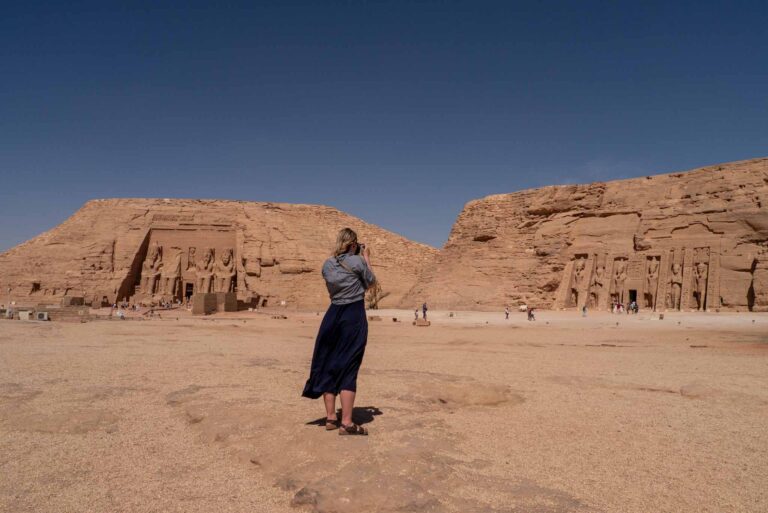
The Temple of Abu Simbel, near the Egypt-Sudan border (not too scammy!)
#3 BE AWARE OF UBER SCAMS IN CAIRO
If you have mobile data in Egypt, Uber seems like an easy and hassle-free way to get around in Cairo. The price is stated up front, and directions in the app mean you don’t face a language barrier explaining where you want to go.
But it’s not always so simple…
Although you theoretically pay the price listed in the Uber app, some drivers will see your foreign name and aggressively push for extra cash. There are two ways they’ll do this. Drivers will usually accept your ride request first (yay!). Then they will private message you in the app asking for more money (one driver wanted $20 USD for a $5 USD ride between Giza and Cairo Station). Or they will wait until you get in the car before aggressively asking that you cancel the ride on the app and pay more in cash.
This seems like a fairly common scam in Egypt. We’d say this happened around 50% of the time in Cairo, but mostly when trying to get to/from touristy places. Don’t be afraid to say no, but always make them cancel the trip to avoid being charged a cancellation fee by Uber.
Top tip: If you get in an Uber, try to keep your bags in the back seat with you. That way, if the driver starts demanding more cash, you can just say no thank you. If they become aggressive, just jump out with all your stuff!
#4 YOUR HOTEL IS (PROBABLY) NOT CLOSED
If you get in a taxi to your hotel they may tell you that they don’t know where your hotel is. They may also tell you that your hotel has had to close because of a leak, a fire, or because it’s a brothel(!). THe same scam can also be used if you want to go to a specific restaurant. They’ll ‘helpfully’ offer to find you an alternative.
There isn’t a high turnaround of businesses in Cairo. And, if you haven’t been contacted by your pre-booked hotel then assume it’s open. This is just another a common scam in Egypt to distract you from your lodging of choice, and for the taxi driver to earn a little commission or send you to his family’s hotel or his nephew’s restaurant.
#5 THE ROAD ISN’T CLOSED EITHER…
So many touts will try and tell you that ‘the road ahead is closed’/too busy to drive, ‘the [insert attraction here’ is too far to walk’ or that ‘vehicles aren’t allowed, the best way is by horseback or camel’.
This is another of many common scams in Egypt. It usually isn’t true and they are just trying to sell you an overpriced horse or camel ride or charge you double for a taxi.
We were walking down the road to the ticket office at the Pyramids when a carriage driver approached us to tell us “The Pyramids are 10 kilometres away, it’s too far to walk and you need to take a carraige”. I could have laughed in his face. The Great Pyramids were right there in front of us.

People who ‘help’ you on the streets usually want a tip…
#6 ‘HELPFUL’ STRANGERS USUALLY HAVE AN ULTERIOR MOTIVE
Egypt has some of the most genuine and hospitable people I’ve met whilst travelling, but there are some bad eggs out there too. And random people who help you on the street usually want something. Whether that’s for you to visit their shop, take their tours, or offer them a tip for their advice, it pays to be wary.
It can be very frustrating for someone to ‘help’ by showing you a museum entrance or the local ferry stop only to hassle you for a tip afterwards. Especially if, like us, you knew where you were going and only had to walk about 10 seconds before you would have been there! Or, to be invited for a cup of tea, and next thing you know, you’re being sold perfumes or papyrus.
Usually I’m all for getting to know the locals. It’s so important for cultural exchange. I don’t think that you need to be distrustful of everyone but do keep your guard up a little bit. Be kind, but firm. And at the Pyramids, just ignore everyone. Otherwise you’ll never escape!
#7 THE PUBLIC FERRY DOES NOT CLOSE
The public ferries in Luxor, between the West Bank and East Bank, and in Aswan to Elephantine Island, do not close. This is another of these common scams in Egypt that touts use to try and get you to take an overpriced trip on their private boats.
Some boat owners will also tell you that ‘the public ferry is this way’ before hustling you into a boat. The public ferry is 10 EGP per person. You pay it at a desk before you get on to the boat. And the ferry won’t leave until it’s somewhat full. If you’re paying on the boat, it’s a private ferry. If the ferry leaves with just you/your group, it’s a private ferry.
Oh, and don’t let anyone buy your ferry ticket for you. Or really any ticket for you. They’ll charge you extra and keep a cut for themselves!
#8 ALWAYS CLARIFY EXACTLY WHAT YOU ARE AGREEING TO
Whether you agree to a taxi, a boat trip, a felucca tour, photos on a camel, or anything else, make sure you are very specific about what you’re paying for.
It’s very common to be quoted a price that seems fair. For example, 50 EGP (£0.80 or $1 USD) to cross the Nile in Luxor. Or $10 USD for a guided tour of the Valley of the Kings.
And then, your driver or guide will turn around after the service and claim that their English is bad and that they meant the price quoted was per person, not total. Depending on the size of the group, this can turn a reasonable price into an extortionate one. And if you have already used the service, you have little bargaining power. Just another of many common scams in Egypt to try and extort extra cash from you!
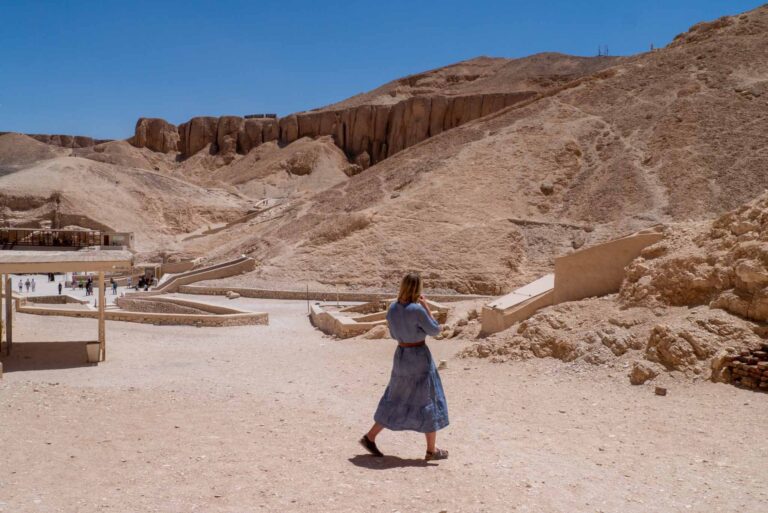
Avoiding common scams at the Valley of the Kings: just keep walking!
HOW TO AVOID BEING SCAMMED IN EGYPT: AT TOURIST SITES
From the Great Pyramids of Giza to the Valley of the Kings, tourist sites in Egypt are prime tout territory. Although the government introduced measures in 2018 to stop aggressive vendors, there’s no way to avoid the sales pressure and elaborate scam attempts.
Many travellers to Egypt visit the country’s attractions on organised day tours from one of the many Red Sea resorts or Nile Cruise boats. And touts know that these tourists have no baseline for how things work, and how much things should cost.
From fake ticket checkers to fake security guards, here are our tips to avoid all of the common scams in Egypt’s tourist attractions.
#9 ALWAYS BUY YOUR TICKETS AT THE OFFICIAL TICKET OFFICE
There are only two offices to buy tickets for the pyramids. These are the main entrance to the Pyramids of Giza at the visitor centre and the less obvious (but less crowded) Sphinx entrance.
All other popular sites (Luxor’s Karnak, Valley of the Kings, Luxor Temple and Abu Simbel) have one obvious ticket office.
You will need to purchase your site ticket at the official booth at the official office plus any extra tickets if you would like to go inside the pyramids or certain tombs. Then you’ll have to scan your ticket and pass a security bag check.
If someone outside of these offices is offering you a ticket, don’t accept. Best case, they will just jsut charge you extra for the ‘service’ of buying your ticket. Worst case, your ticket is fake.
Top tip: Do not try going in any entrance that is not the main entrance at any site, unless you already have tickets and know what you’re doing. For example, the pyramids have a separate entrance for camels and horses. This entrance is scam central as touts try to get you on an overpriced horse/carriage ride to the main entrance! Yet another of many common scams in Egypt.
#10 YOU DON’T NEED TO SHOW YOUR TICKET TO ANYONE AFTER THE VISITOR CENTRE
Once you pay for your ticket and pass the security check of any popular tourist site, you’re in! The entrance to the site and the entrance to each tomb/pyramid are the only places you will need to get your tickets checked.
Those guys standing on the walkway to the first pyramid in Giza? Or the ones who ask for your ticket in an official tone immediately after you pass the visitor centre? Yep, they’re fake. Even if they have a official-looking lanyard and ID.
In order to sell camel rides and tours at historic sites, the locals are required to have a government-issued ID. They’ll come up to you and briefly flash their lanyard, claiming to be a guard or employed by the site.
This is another of many common scams in Egypt, but particularly at the Pyramids. These touts either want to tell you you bought the wrong ticket and it’s ‘X’ more EGP to enter ‘this section of the site’. Or, they pretend to check your ticket to get talking to you before offering their services as your ‘official’ tour guide.
Just say no, and move along!
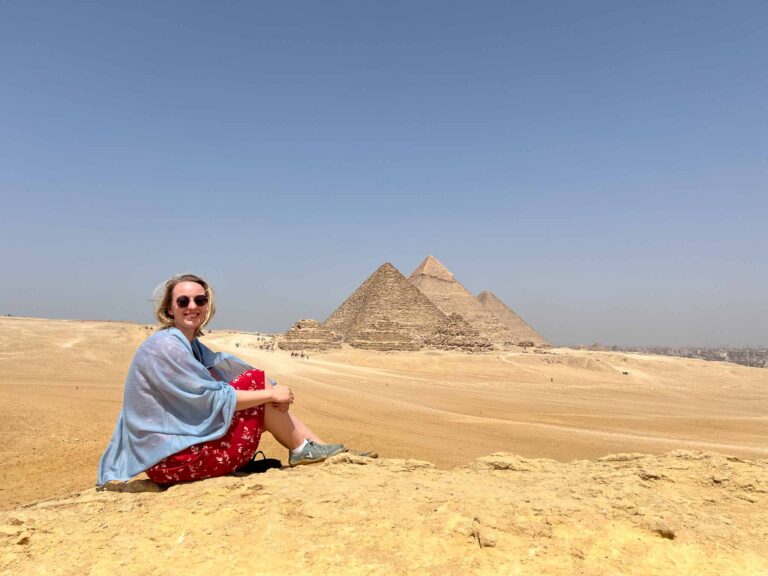
No, it is not against the law to go to this viewpoint without a camel ride.
#11 YES, YOU PROBABLY ARE ALLOWED TO GO THERE
There’s an amazing viewpoint at the pyramids that’s about a 15-minute walk down a sandy path and up some sand dunes. It’s a popular place for horse and camel rides.
Touts will yell that you aren’t allowed to walk there, or that you can only go to this viewpoint by camel or horse.
As usual, this is a common scam in Egypt. They are lying to try and get you on an overpriced camel or horse ride. If there are no signs, no fence, and no official security guards telling you off, then you can probably walk there.
Talking about camels and horse rides…
#12 NEVER GET ON A CAMEL OR A HORSE CARRIAGE
Never get on a camel or horse carriage. Especially at the Great Pyramids of Giza, but anywhere really.
Firstly, touts will tell you that “it’s too far to walk”, but you can easily around most sites. Yes, you can walk between the pyramids (it takes 5 mins) and the train station in Luxor is only a 5 minute walk from Luxor Temple.
Secondly, camel touts and horse carriages will often quote a ridiculously low price but they DON’T mean it. Once you’re on the camel, they may not get the camel to let you down until you pay double or triple what they quoted.
Top tip: there are official government signs that quote the price of a 1-hour camel ride. During our visit, this was 500 EGP (~ £8 GBP or $10 USD). Expect that price, and demand that price. You can also try and bargain for a cheaper price, especially if you speak Arabic.
Touts may also offer you a photo opportunity on their camel for a cheaper price than a ride. You’ll excitedly smile and hand over your phone – we all want good photos at the Pyramids, right? After you goof around for dozens of photos, the scammer might tell you the agreed price was ‘per photo’, not for the overall experience. Worst case, they’ll withhold your phone or won’t let you down until you pay up!
You can avoid this by just not getting on a camel in the first place!
#13 DON’T LET ANYONE TAKE YOUR PHOTO
If someone offers to take a photo of you, they just hustling for a tip. And the photos will likely be terrible.
If someone wants to take a photo with you, especially if it’s on their phone, they probably do not want a tip. Probably…
Historic sites in Egypt aren’t just for foreign travellers! They get a lot of Egyptian tourists and school groups too, especially on the weekends and public holidays.
Depending on what you look like, you could get a lot of children on school trips or with their families asking if they can take a selfie with you. To them, meeting foreign tourists can be a really cool experience.
Say yes if you’re comfortable, otherwise, a simple no thank you (la shukran [pronounced la SHOOK-ran] in Arabic) is fine.
Top tip: You’re always best asking another tourist to take a photo of you if you want one. If you’re shy, you can always offer to take a picture for someone else who looks like they might like one (usually couples are happy to have photos together). Then you can ask for one in return. Or, ask a fellow tourist with a DSLR slung around their neck! They likely will have a good idea of how to frame flattering photos.
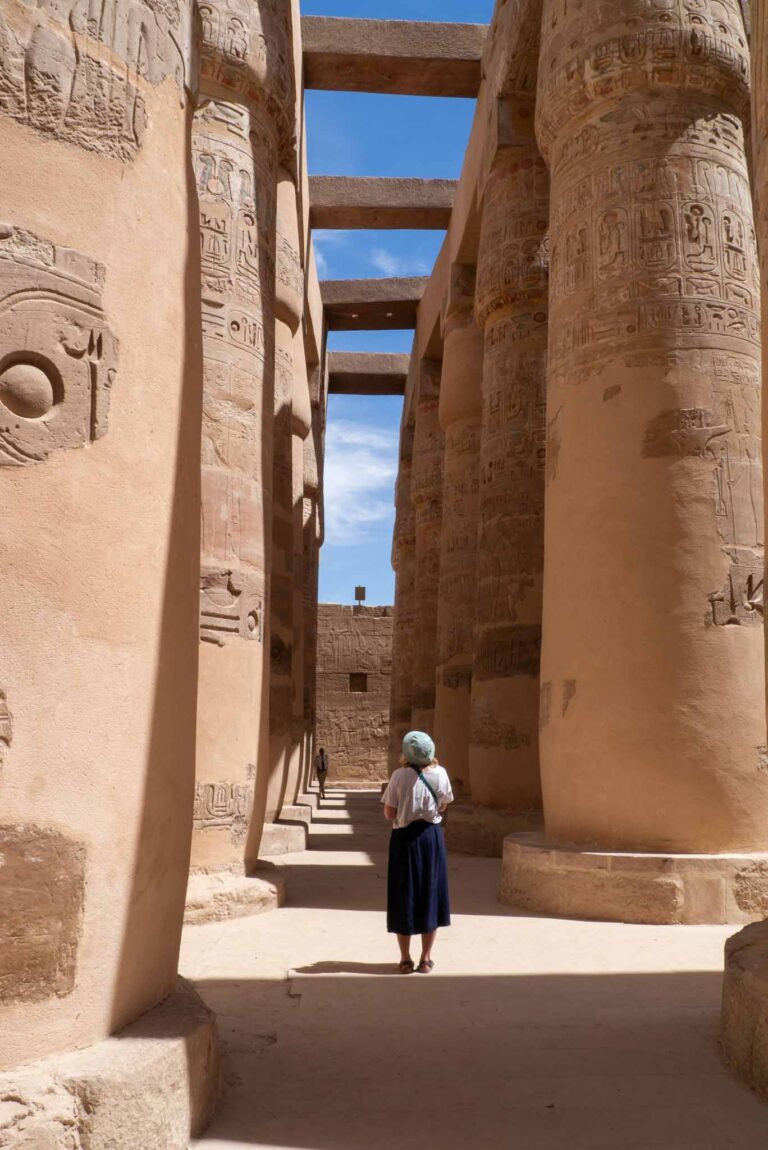
If you want good photos, travel with a buddy or find a tourist with a camera around their neck!
#14 GOING INSIDE MOSQUES AND CHURCHES IS (USUALLY) FREE
With the exception of St Catherine’s Monastery, Sultan Hassan and Ar Rifai, most mosques and churches in Egypt are free to visit. However, some caretakers will claim an admission fee.
If you do have to pay, there will be a clear ticket booth and you will receive a paper ticket. If you’re not sure, ask if there is a ticket and politely refuse payment if there is none.
#15 DON’T GET PUSHED INTO PAYING FOR A TOUR YOU DON’T WANT
On our trip, we found that most tour guides have official badges and set prices. They’ll ask you upon entry if you’d like a tour, tell you how much it costs, and you’re free to say yes or no as you like (no harassment!)
However, some guides operate unofficially. If someone just happens to walk into a temple or mosque at the same time as you and immediately starts chatting about the incredible history of this ancient tomb, then you, my friend, have unknowingly found yourself on a tour!
If you want a guided tour, great! Keep talking. If you do not, then kindly but firmly tell them so. Otherwise, your new ‘friend’ may expect you to fork out some ridiculous fee at the end of your visit.
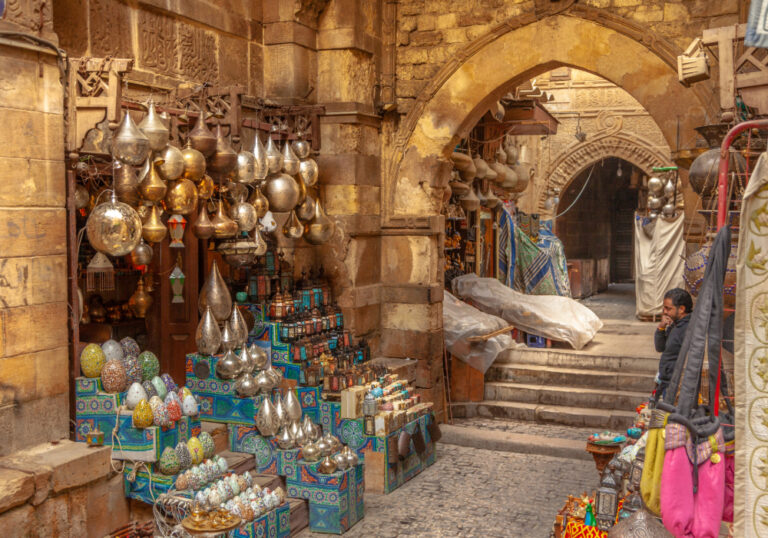
Shopping in Cairo’s Khan-el-Khallili
HOW TO AVOID BEING SCAMMED IN EGYPT: SHOPPING
If you can make it through a holiday in Egypt without finding yourself in a shop selling tacky mass-produced trash at least once, then you’re doing better than we did!
Shopping in Egypt is exhausting, overwhelming, and stressful. Set prices don’t exist so it’s the perfect chance for an opportunistic vendor to extort a little (or a lot!) extra cash from you. Here are our top tips for avoiding scams whilst shopping in Egypt!
#16 HAGGLE FOR EVERYTHING
Nothing in Egypt has a set price. Everything is up for negotiation.
This isn’t really a scam. Haggling is part of everyday life in Egypt, even for locals. If you’re willing to discuss a transaction over tea or shop around until you find a good price, you can get some great deals. If your time is more valuable, then you’re expected to pay more. Simple!
The hustle comes in when vendors eye you up and judge how much you can afford, often quoting an eye-watering price.
Shopping this way can seem like a hassle, but it’s best if you see it as a game, not a fight! We recommend asking around your fellow travellers or at your hotel before booking any trips, hiring a guide, or buying anything. Then try to bargain for a similar or better price than what they got.
The best way to haggle is to decide how much you want to pay, and then express a casual interest (don’t get too excited!). From there, I usually offer a bit lower than the price I had in mind. If you’re buying multiple items, you can use this as a bargaining chip to get a sweet deal.
You should never haggle over something you have zero intention of buying. But it’s always ok to walk away if you can’t reach a deal. And although a vendor may try and guilt you into paying more (“I’m selling it below cost for you!”, “I need to make money for my family I can’t go any cheaper”), they’ll never sell an item below what it costs, even if he will try and convince you otherwise.
Here’s list of some common local prices:
- Soda or similar drink: 10 to 20 EGP (depending on where you are)
- 1.5 Litre water bottle: 10 EGP
- Local ferry across the Nile: 10 EGP
- Street food at local eatery: falafel (35 EGP) or shawarma (100 EGP)
- Traditional tagine-based meal at tourist restaurant: 200 EGP
- Cost of day hire for a felucca: 4000 EGP (split between however many tourists are on the boat)
- 30 min Minibus Journey: 30 EGP
- 15 min taxi ride: 100 EGP
- 10 min tuk-tuk ride: 60 EGP
- Papyrus souvenir: 30 EGP
#17 THERE’S NO SUCH THING AS A PAPYRUS OR ALABASTER MUSEUM
It’s a shop.
Touts inside the ‘museum’ will offer you a cup of tea and a quick five to ten-minute explanation of how papyrus is made, before starting to push their products.
The products in these ‘museums’ may come with a ‘certificate of authenticity’ but they’re the same things you can get in any market for a fraction of the price. It’s a common scam in Egypt to get you to fork over more than you should for a cheaply manufactured product.
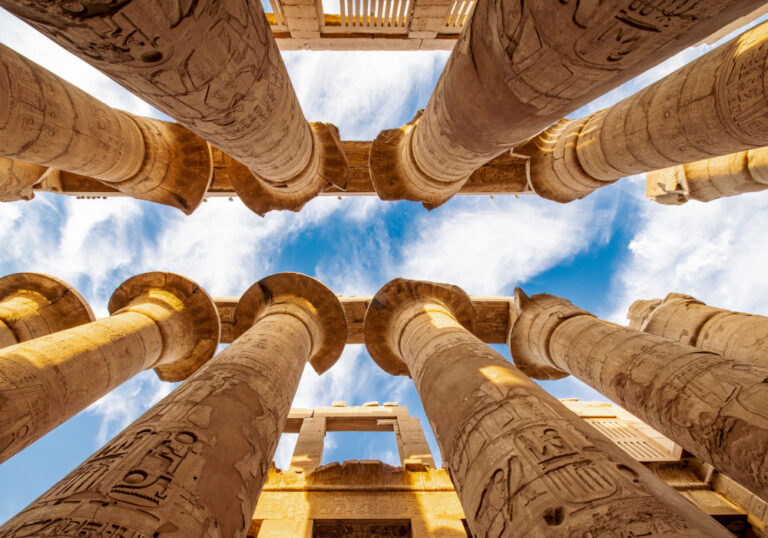
Never buy trinkets at any popular tourist sites.
#18 DON’T BUY ANY TRINKETS AT TOURIST SITES
Don’t do your souvenir shopping at the Pyramids, the Valley of the Kings, and yep, even the Khan El Khalili. It’s not a scam per se, but all the souvenirs here are fake, mass-produced garbage and the prices are super inflated.
The same goes for water, snacks, or a cup of tea. Expect to pay quadruple what you’d pay elsewhere. For example, a cup of tea in Egypt usually costs 10 – 20 EGP. In the Khan El Khalili, they were charging 90 – 100 EGP!
#19 IF IT SOUNDS TO GOOD TO BE TRUE, IT PROBABLY IS
Vendors at tourist sites often all sell the same mass-produced rubbish. And when every shop is selling exactly the same, this creates a lot of competition.
Vendors may try to lure you in with a cheap price. They’ll come up to you with their hands full of wares, proclaiming that “this handmade silk scarf is only 10 EGP (£0.16 or $0.20 USD)”. Perfect, you think, I’ll get one for everyone and that’s Christmas gifts sorted for this year.
You allow yourself to be ushered into their shop. Once they’ve got your attention, they’ll tell you that their English is poor, and they meant 10 British Pounds (instead of Egyptian), Euros, or American Dollars.
#20 ALWAYS ASK FOR THE PRICE UP FRONT.
It almost feels like an Egyptian Custom when you ask the price and they’ll tell you “oh don’t worry, you can pay at the end”. We encountered this in hotels, and also in shops (“just pop everything you like on this table and we’ll discuss a price once you’ve picked things out”)
Most of the time it’s harmless. Egyptians are very trusting people. You’ll rarely be expected to pay before you use a service. If anyone asks you to pay before, run. It’s not uncommon to pay upfront, only to never see or hear from that tour guide again.
That said, anyone who tells me not to worry about a price instantly makes me worry. I like to know what I’m paying upfront to avoid a nasty surprise at the end, which is a fairly common scam in Egypt. It’s not rude to tell them you want to know beforehand. After all, once you’ve eaten the food or used the service, you have little to no bargaining power.
#21 NOTHING COMES FREE
Most tourist shops will offer you a cup of tea and it can seem rude to decline! But when you don’t buy anything later, often the owner will try to guilt you. Just remember, it’s ok to say no. They were the ones who offered a free drink or free gift in the first place.
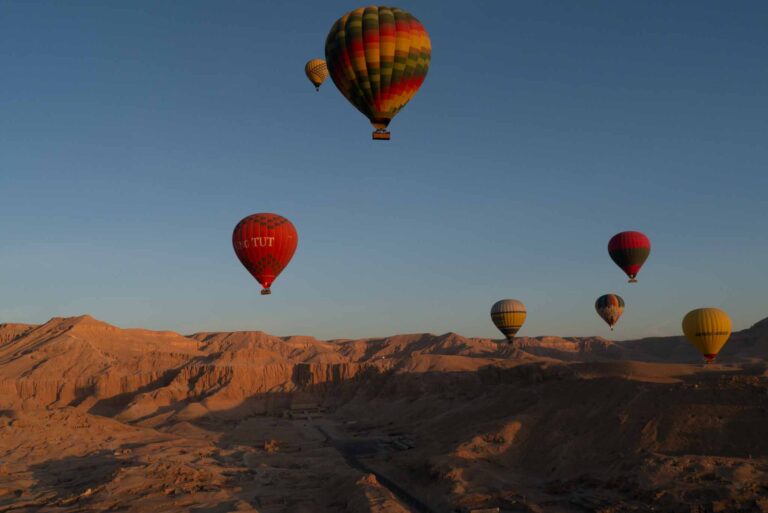
We must have said ‘no’ thousands of times to tour guides…
HOW TO SAY NO TO TOUTS
We’ve travelled a lot, but the touts and vendors of Egypt were among the most persistent and annoying. You have to say no a LOT before they actually leave you alone.
Even after we returned home, we were still being contacted by the Egyptian tour guides we booked tours with. I’m serious, I made the mistake of giving one felucca boat owner my Instagram and he texts me ‘good morning’ and tries to video call with me multiple times a week. It’s frustrating!
That said, it’s all pretty harmless and most Egyptians are friendly and genuine people. Be kind but firm. It’s absolutely ok to say hello, smile or acknowledge someone. But be insistent if you don’t want what they have to offer and keep walking.
Often it helps to speak a little Arabic, as it’ll make you seem less like a clueless tourist. Here are our favourite phrases:
La Shukran – No thank you
La la la la la – No, no, no no, no
Inshallah – ‘if God wills it’. It’s my favourite word to get out of every situation, for example, if a market vendor or felucca boat owner is trying to make me promise to come back tomorrow to buy something or to take a boat trip. Most Egyptians are very religious so will leave you alone, as to do otherwise would be to mess with God’s plan! You might even get a little extra respect too!
AND BEFORE YOU LEAVE, A LITTLE PERSPECTIVE
Remember, Egypt is, for the most part, a safe country to travel in. Sometimes the touts are frustrating and a little aggressive, but they’re pretty harmless. They don’t want to attack you or steal your stuff. They just want to extort a little extra cash from you without you realising.
If you do feel like you might explode at the next ‘excuse me my friend, where are you from’, take a deep breath and put it into perspective. Touts aren’t picking on you specifically, this is just their job. Like people everywhere, they also have families to feed and bills to pay. The competition is fierce, and if you aren’t their customer, then you’re likely somebody else’s. So you can’t blame them for trying extra hard to win your custom.
You might feel a bit stung at times, especially if you find out in hindsight that you were ripped off. But that extra couple of £/$/€ that you paid will go a much further in Egypt than it would back home. So take a deep breath and plaster a smile on your face as you use my little Egypt mantra; breathe in, breathe out, be kind.
And that’s it! You’re officially ready to navigate Egypt like a pro! Have an amazing time in this country. If you let it, Egypt will steal your heart like it did mine.
If my content helped you plan your next adventure, taught you something new, or simply made you smile, consider supporting the site! A small donation helps keep this blog going, fuels my creativity, and maybe even buys me a coffee along the way. Thank you for being here and being part of this journey! 😊
LIKE IT? PIN IT!
SAVE THIS POST TO YOUR PINTEREST BOARD TO COME BACK LATER
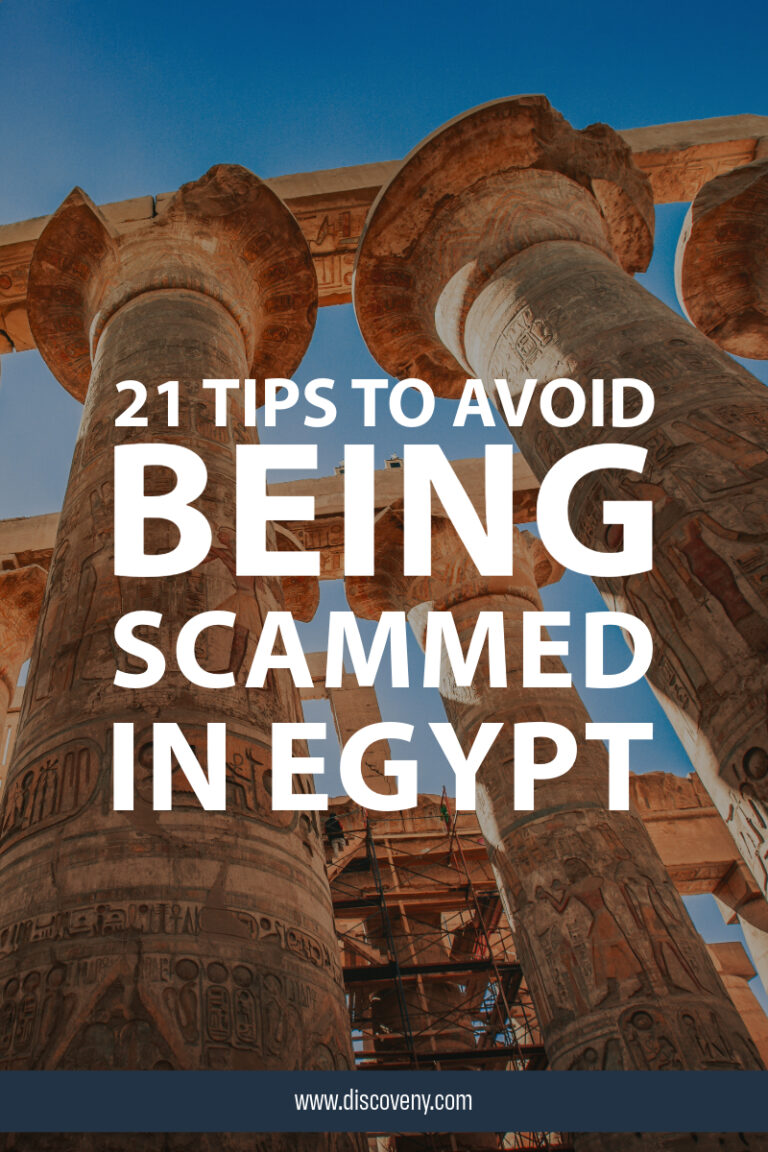
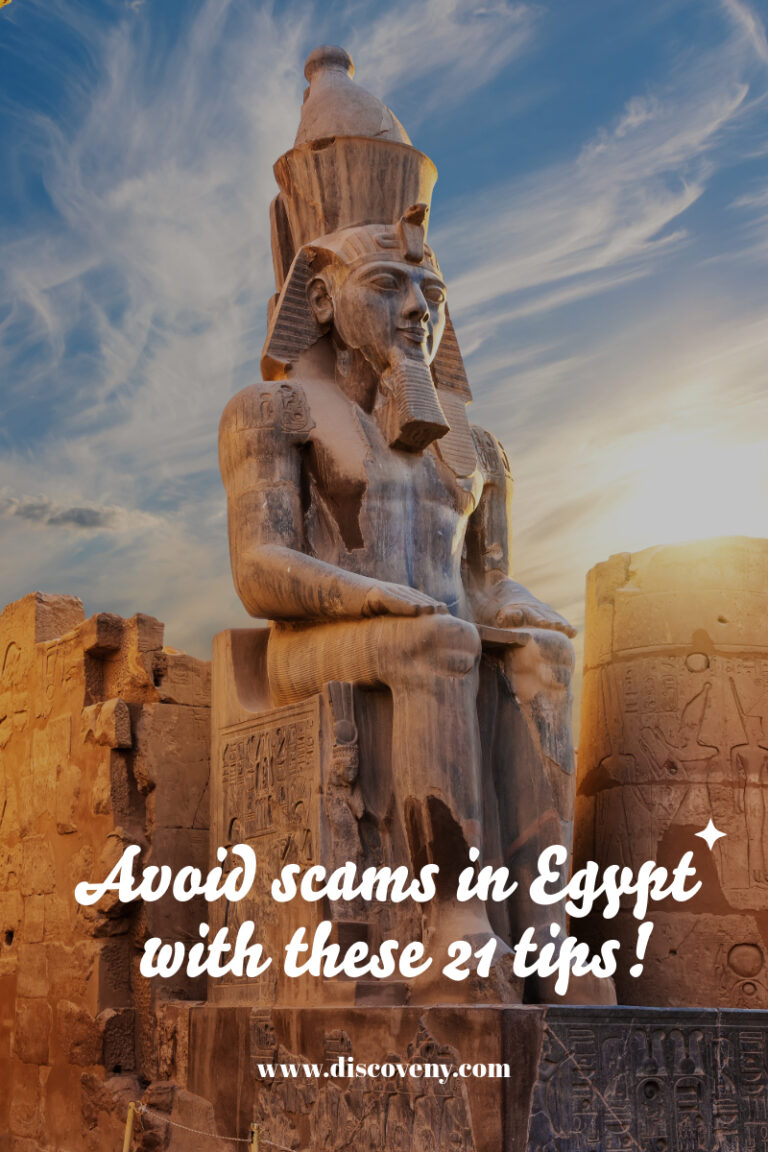
Follow our daily adventures on Facebook and Instagram
Disclaimer: The information and advice provided in this blog are the author’s opinions and based on their personal experiences. All information was accurate at the time of writing. However, things can change quickly, so always double-check current conditions and guidelines before setting out. Remember, your travels and safety are your own responsibility, and this blog can not be held responsible for anything that might happen on your adventures! Always exercise caution and good judgment. Oh, and don’t forget to get travel insurance! Happy travels!
This post may contain affiliate links (yay for transparency!) This means that I will earn a small commission, at no additional cost to you, if you click the link and choose to buy the product. I only link to stuff I have personally bought and found useful and never endorse crap. Your support helps keep the site going, thank you!
Alice
Alice is a UK travel blogger who advocates sustainable travel and being more eco-conscious on a budget. She loves coffee, her houseplants and summiting mountains.
You May Also Like
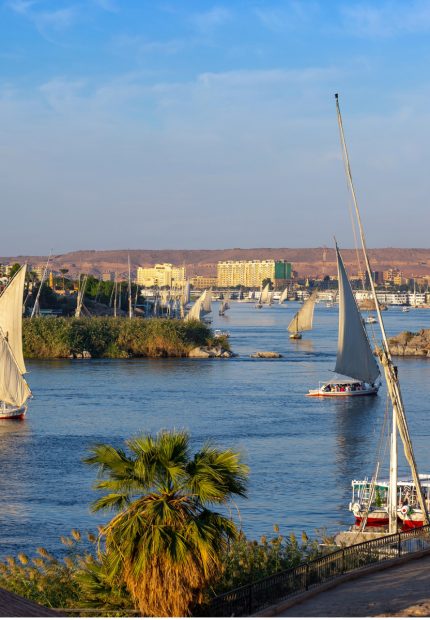
Plan Your Visit to Elephantine Island, Aswan: Museum, Ruins, and Nearby Highlights
September 14, 2024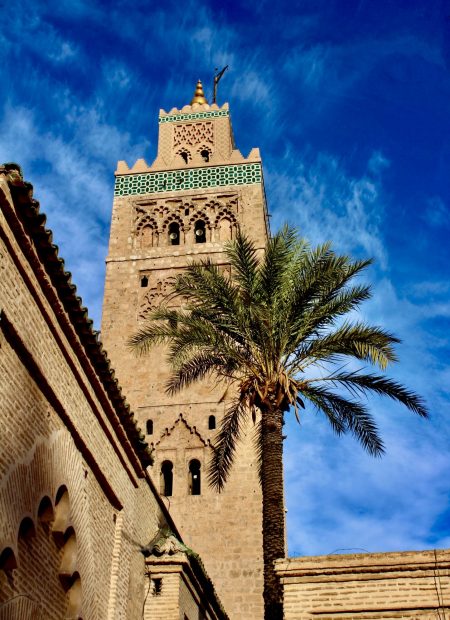
Female Traveller in Morocco – What’s It Really Like?
November 14, 2020

2 Comments
Thea
Hi Alice! Thanks for this article… am travelling to Egypt in Nov by myself (am early 50’s) and am SO excited!! Question: I want to go to Mt Sinai/St Catherine’s- climb during the day, watch the sunset, spend the night, come down the next day… How do you suggest I get from Cairo to.. Durham (sp)? A guide I already talked to said he’d take me for $125 US each way (I’m Canadian and our dollar Sucks against the US dollar…) so should I bus it? Please email me so I can pick your Brain … Thanks!! Thea
Alice
Hi Thea! We visited Mt Sinai from Dahab, which is pretty close by. You can absolutely get to Dahab using the local buses. It helps if you have an Egyptian SIM Card but this isn’t necessary – just makes it slightly cheaper. From Dahab to Mt Sinai you’ll likely need a private driver or to join a small group tour but it will definitely be cheaper than $125 USD (which honestly, seems extortionate for Egypt!). Let me know how you get on 🙂